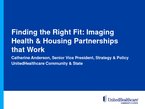0
Webinar
Community:
Dec 17, 2018
Webinar slide deck that provides a brief overview of FUP, building blocks of successful FUP voucher implementation, facilitated panel on increasing impact and enhancing FUP operations, and other opportunities and resources.
Authored by: CSH: 1 Roof and CLPHA
Topics: Child welfare, CLPHA, Foster care, Funding, Housing, Legislation & Policy, Low-income, Partnerships, Preventative care, Safety, Supportive housing, Youth
 Shared by Mica O'Brien
Shared by Mica O'Brien
Mica O'Brien posted a
on Dec 18, 2018
Webinar slide deck that provides a brief overview of FUP, building blocks of successful FUP voucher implementation, facilitated panel on increasing impact and enhancing FUP operations, and other opportunities and resources.
0
Publication
Community:
Nov 20, 2018
People with mental health disabilities are vastly overrepresented in the population of people who experience homelessness. Of the more than 550,000 people in America who experienced homelessness on a given night in 2017, 1 in 5 had a mental illness. The proportion of people experiencing chronic homelessness with mental health disabilities was even higher—nearly 1 in 3. Despite this fact, the reality is that most people with mental illness fortunately do not experience homelessness: While about 20 percent of all adults in the United States have a mental illness, less than two-tenths of 1 percent of people in the country experienced homelessness on a given night in 2017.
Authored by: Heidi Schultheis for Center for American Progress
Topics: Depression, Disabilities, Homelessness, Housing, Legislation & Policy, Low-income, Mental health, Partnerships, Preventative care, Stability, Substance abuse, Supportive housing
 Shared by Mica O'Brien
Shared by Mica O'Brien
Mica O'Brien posted a
on Nov 20, 2018
Heidi Schultheis for Center for American Progress
People with mental health disabilities are vastly overrepresented in the population of people who experience homelessness. Of the more than 550,000 people in America who experienced homelessness on a given night in 2017, 1 in 5 had a mental illness.
0
News Article
Community:
Nov 14, 2018
HHS Secretary Alex Azar on Wednesday said Medicaid may soon allow hospitals and health systems to directly pay for housing, healthy food or other solutions for the "whole person."
Authored by: Paul Barr and Virgil Dickson for Modern Healthcare
Topics: Health, Housing, Legislation & Policy, Medicaid / Medicare, Mental health, Preventative care
 Shared by Mica O'Brien
Shared by Mica O'Brien
Mica O'Brien posted a
on Nov 15, 2018
Paul Barr and Virgil Dickson for Modern Healthcare
HHS Secretary Alex Azar on Wednesday said Medicaid may soon allow hospitals and health systems to directly pay for housing, healthy food or other solutions for the "whole person."
0
Report
Community:
Aug 1, 2018
Through the hard work of communities around the country, we now have proof of something that we didn’t before—that ending homelessness is achievable. Home, Together builds upon what we have learned from states and communities over time, and lays out the strategies we know we must advance at the federal level in order to support and accelerate state and local progress.
Authored by: United States Interagency Council on Homelessness
Topics: Cost effectiveness, Data sharing, Disabilities, Dual-generation, Homelessness, Housing, Legislation & Policy, Low-income, Mental health, Partnerships, Preventative care, Racial inequalities, Stability, Substance abuse, Supportive housing
 Shared by Housing Is
Shared by Housing Is
Housing Is posted a
on Aug 7, 2018
United States Interagency Council on Homelessness
Through the hard work of communities around the country, we now have proof of something that we didn’t before—that ending homelessness is achievable.
0
Policy Brief
Community:
Jul 19, 2018
This policy brief examines how the physical inspection process can promote healthy affordable housing. A review of housing quality issues linked to health and the role of physical inspections to improve health is provided.
Authored by:
Topics: Asthma, Child welfare, Health, Housing, Lead, Legislation & Policy, Low-income, Preventative care, Safety
 Shared by Housing Is
Shared by Housing Is
Housing Is posted a
on Jul 19, 2018
This policy brief examines how the physical inspection process can promote healthy affordable housing. A review of housing quality issues linked to health and the role of physical inspections to improve health is provided.
0
Publication
Community:
Jul 13, 2018
Authored by:
Topics: CLPHA, Data sharing, Health, Housing, Legislation & Policy, Low-income, Medicaid / Medicare, Partnerships, Preventative care, Research
 Shared by Housing Is
Shared by Housing Is
Housing Is posted a
on Jul 13, 2018
0
Publication
Community:
Jul 12, 2018
This report examines four specific aspects of the challenge before us:
• The need for a much greater supply of homes affordable to our nation’s lowest-income seniors.
• The importance of transforming homes and communities so that seniors can age with options, a desire shared by the overwhelming majority of older adults.
• The imperative to better integrate health care and supportive services with housing, recognizing that this integration has the potential to improve health outcomes for seniors and reduce the costs borne by the health care system.
• The need to deploy technologies on a far wider scale to help all Americans age successfully.
Authored by:
Topics: Cost effectiveness, Funding, Health, Home visiting, Homelessness, Housing, Legislation & Policy, Low-income, Medicaid / Medicare, Partnerships, Place-based, Preventative care, Seniors, Supportive housing
 Shared by Housing Is
Shared by Housing Is
Housing Is posted a
on Jul 12, 2018
This report examines four specific aspects of the challenge before us:
• The need for a much greater supply of homes affordable to our nation’s lowest-income seniors.
• The importance of transforming homes and communities so that seniors can age with options, a desire shared by the overwhelming ma
0
Report
Community:
Jul 12, 2018
This article deconstructs the history, structure, and financing that have made this unique partnership between Philadelphia's Department of Behavioral Health and Intellectual Disabilities, the Office of Homeless Services, and the Housing Authority, possible.
Authored by:
Topics: Data sharing, Disabilities, Dual-eligibles, Health, Housing, Legislation & Policy, Low-income, Medicaid / Medicare, Mental health, Partnerships, Preventative care, Research, Supportive housing
 Shared by Housing Is
Shared by Housing Is
Housing Is posted a
on Jul 12, 2018
This article deconstructs the history, structure, and financing that have made this unique partnership between Philadelphia's Department of Behavioral Health and Intellectual Disabilities, the Office of Homeless Services, and the Housing Authority, possible.
0
Report
Community:
Dec 6, 2017
It adds to the growing body of evidence that addressing homelessness saves money elsewhere.
Authored by: J.B. Wogan for Governing the States and Localities
Topics: Cost effectiveness, Criminal justice, Health, Healthy homes, Homelessness, Housing, Legislation & Policy, Place-based, Preventative care, Research, Stability, West Coast
 Shared by Housing Is
Shared by Housing Is
Housing Is posted a
on Jul 5, 2018
J.B. Wogan for Governing the States and Localities
It adds to the growing body of evidence that addressing homelessness saves money elsewhere.
0
Report
Community:
Nov 1, 2017
Why do some neighborhoods appear able to launch effective local improvement initiatives, while others are more hampered by fragmentation and mistrust? Why can some communities mobilize diverse constituencies to influence public policy, while others cannot? Answers to these questions may be found in the specific patterns of collaboration that form among community organizations, and between these groups, schools, public agencies, and elected officials, according to MDRC, a preeminent social-policy research organization.
Authored by: MDRC
Topics: Asset building, Child welfare, Community development, Data sharing, Dual-generation, Education, Family engagement, Funding, Health, Housing, Legislation & Policy, Low-income, Metrics, Midwest, Mobility, Out-of-school time, Partnerships, Place-based, Preventative care, Research, Safety, Stability, Workforce development, Youth
 Shared by Mica O'Brien
Shared by Mica O'Brien
Mica O'Brien posted a
on Jun 29, 2018
Why do some neighborhoods appear able to launch effective local improvement initiatives, while others are more hampered by fragmentation and mistrust? Why can some communities mobilize diverse constituencies to influence public policy, while others cannot?
1
Video
Community:
May 23, 2018
The Council of Large Public Housing Authorities (CLPHA) hosted The Housing Is Summit in Washington, D.C., on May 3-4, 2018 with 300 partners across the housing, education, and healthcare sectors. Access video recordings of the Summit's keynote speakers (HUD Secretary Ben Carson, John Bridgeland, Matthew Morton), plenary panels (on topics that cut across sectors like anchor institutions, data collaboration, stability, and foundation investments), and select breakout sessions focused on the intersections of housing, education, and health.
Authored by: Council of Large Public Housing Authorities
Topics: Affordable Care Act, Attendance, Child welfare, CLPHA, Community development, Data sharing, Dual-eligibles, Dual-generation, Early childhood, Education, Funding, Grade-level proficiency, Health, Healthy homes, Homelessness, Housing, Legislation & Policy, Low-income, Medicaid / Medicare, Mental health, Metrics, MTW, Out-of-school time, Partnerships, Place-based, Preventative care, Racial inequalities, Research, School-readiness, Seniors, Stability, Substance abuse, Supportive housing, Sustainability, TA, Workforce development, Youth
 Shared by Steve Lucas
Shared by Steve Lucas
Steve Lucas posted a
on May 23, 2018
The Council of Large Public Housing Authorities (CLPHA) hosted The Housing Is Summit in Washington, D.C., on May 3-4, 2018 with 200 partners across the housing, education, and healthcare sectors. The Summit highlighted the ways that we can transform systems to better serve low-income people with two days of plenary speakers/panels, breakout sessions, and caucus discussions geared toward intersectional thinking and ways to take action.
Council of Large Public Housing Authorities
The Council of Large Public Housing Authorities (CLPHA) hosted The Housing Is Summit in Washington, D.C., on May 3-4, 2018 with 300 partners across the housing, education, and healthcare sectors.





 Shared by Housing Is
on Aug 7, 2018
Shared by Housing Is
on Aug 7, 2018

 Shared by Housing Is
on Jul 19, 2018
Shared by Housing Is
on Jul 19, 2018
 Shared by Housing Is
on Jul 13, 2018
Shared by Housing Is
on Jul 13, 2018
 Shared by Housing Is
on Jul 12, 2018
Shared by Housing Is
on Jul 12, 2018
 Shared by Housing Is
on Jul 12, 2018
Shared by Housing Is
on Jul 12, 2018

 Shared by Housing Is
on Jul 5, 2018
Shared by Housing Is
on Jul 5, 2018



 Shared by Steve Lucas
on May 23, 2018
Shared by Steve Lucas
on May 23, 2018







